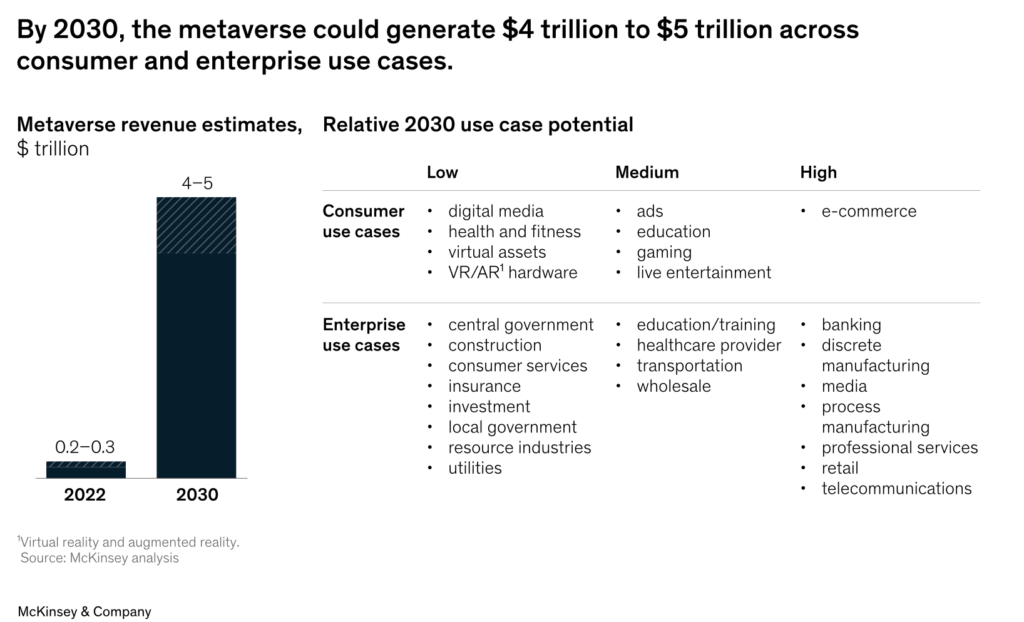
By using By Homayoun Hatami, Eric Hazan, Hamza Khan, and Kim Rants, McKinsey Quarterly
Out of the blue, the metaverse is in the zeitgeist, for far better or worse. Expense additional than doubled in 2022 run by big moves (these types of as Microsoft’s $69 billion acquisition of Activision Blizzard, now below antitrust overview) and smaller types (about $12 billion to $14 billion of venture funds and private fairness investment decision). Everybody has listened to about the successes racked up by some major gaming companies: Roblox claimed extra than 58 million day by day active people in 2022,1 although Fortnite experienced much more than 20 million in 2020 and generated a lot more than $9 billion in sales among 2018 and 2019.2 And some others are investing Meta continues to expend at the very least $10 billion yearly on metaverse advancement. But traders are asking inquiries of metaverse providers about when they can be expecting tangible, close to-time period results from these companies’ investments.
How really should CEOs view the metaverse? Is it a significant prospect or a big threat? Our response: the possibility is enormous—and the hazard is not what you consider it is. The organizations that are making the metaverse see it as the upcoming iteration of the online (see this McKinsey Explainer for much more). And as with any engineering so extensive and all-encompassing (it is comparable to AI in its scope), the potential is great. We estimate that the metaverse could make $4 trillion to $5 trillion in benefit by 2030 see our report for all the specifics.
The situation for optimism
When we believed the current market benefit of metaverse exercise in June 2022, we calculated that it was amongst $200 billion and $300 billion. It’s much larger now, and in eight years or so, it could be $4 trillion to $5 trillion (exhibit), which is roughly the dimension of Japan’s economic climate, the 3rd biggest in the globe. Exponential advancement is probable because of an alignment of several forces: the metaverse’s attractiveness spans genders, geographies, and generations individuals have now revealed they are prepared to expend on metaverse belongings they are open up to adopting new systems corporations are investing heavily in the essential infrastructure and models experimenting in the metaverse are acquiring that buyers are delighted.

The sheer scale compels CEO attention. As the outdated declaring goes, a billion right here and a billion there, and quite shortly you’re chatting about serious money—and $5 trillion is a ton of billions. For context, we estimate that the street to web zero will call for $3.5 trillion in yearly paying out and that the ongoing shift to the cloud holds an possibility for an further $3 trillion.
The variety we have set on the metaverse’s probable is so massive due to the fact the metaverse is a combinatorial technological innovation: it brings together aspects of a lot of of the top rated developments that the McKinsey Engineering Council recognized this calendar year as most promising, like AI, immersive truth, superior connectivity, and Net3. Which is the main explanation CEOs really should be intrigued yet another is that the metaverse touches on quite a few parts of the company. The CEO is the purely natural integrator who can marshal the company’s methods to put collectively a coherent, benefit-pushed response. And with the CEO’s assistance, there is fewer opportunity that the metaverse energy will get stuck in “pilot purgatory.”
…
A extensive way to go
Skeptics observe that other systems have in some cases taken a remarkably extensive time to arrive at their professional possible. AI is one even following a decades-lengthy “AI wintertime,” numerous analysts believe that AI continue to has not attained its prospective, nevertheless the the latest advancements in generative AI are bringing many skeptics all-around. Autonomous motor vehicles are one more. Isn’t there a chance that the metaverse will endure a similar fate? Place yet another way, exactly where are we on the buzz cycle? Peak of inflated expectations? Or headed into the trough of disillusionment?
In our perspective, the advancement of the metaverse is a handful of years away from a true tipping point. It could very easily get for a longer period (while that’s no cause not to get ready).
As Brian Solis of Salesforce shared with us lately, generational modifications like Internet 1., social media, and mobile “rarely take place overnight. They choose yrs and are the result of an accumulation of incremental technological advancements, evolving client desire, and cycles of experimentation.” That looks an apt description of the hurdles that the metaverse should prevail over.
“Generational modifications like Net 1., social media, and mobile not often happen overnight. They acquire several years and are the end result of an accumulation of incremental technological developments, evolving shopper need, and cycles of experimentation.”
The technological know-how is not but ready to support the metaverse at scale: advances in 5G networks, edge computing, components, and software program have to arrive on the internet (they are in progress). At the instant, audiences are generally avid gamers and the technically savvy some others ought to be recruited (our surveys recommend they are quite interested). Lots of metaverse transactions are made in cryptocurrency we’ve all seen the shortcomings of crypto as a dependable, risk-free procedure of trade. Finally, there is no connection between all the various partial metaverses (Roblox, the Sandbox, and a lot of some others). The built-in or legitimate metaverse is a very long way off.
Remember to simply click right here for the short article in its entirety.
Make sure you examine McKinsey’s interview with Brian Solis about the Metaverse listed here.
About the Authors
Homayoun Hatami is the handling companion for global consumer abilities and a senior spouse based mostly in McKinsey’s Paris workplace, the place Eric Hazan is a senior lover. Hamza Khan is a partner in the London business office. Kim Rants is an affiliate companion in the Copenhagen office. The authors would like to thank Nikita Pillai and Adam Ridemar for their contributions to this report.












More Stories
Business email hosting trends and the future of email hosting
Want to be more present? Try taking out your phone
The Detailed Job Description of a Retail Buyer